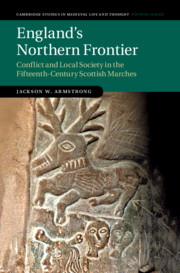Book contents
- England’s Northern Frontier
- Cambridge Studies in Medieval Life and Thought
- England’s Northern Frontier
- Copyright page
- Dedication
- Contents
- Figures
- Maps
- Acknowledgements
- Abbreviations
- 1 Introduction
- Part I
- Part II
- Part III
- 6 The Administration of Justice
- 7 Patterns of Conflict
- 8 Cross-Border Conflict
- 9 Discord
- 10 Concord
- 11 Conclusions
- Bibliography
- Index
8 - Cross-Border Conflict
from Part III
Published online by Cambridge University Press: 30 October 2020
- England’s Northern Frontier
- Cambridge Studies in Medieval Life and Thought
- England’s Northern Frontier
- Copyright page
- Dedication
- Contents
- Figures
- Maps
- Acknowledgements
- Abbreviations
- 1 Introduction
- Part I
- Part II
- Part III
- 6 The Administration of Justice
- 7 Patterns of Conflict
- 8 Cross-Border Conflict
- 9 Discord
- 10 Concord
- 11 Conclusions
- Bibliography
- Index
Summary
In order to continue to assess the effect of the frontier on local conflict, this chapter considers activities in the marches with a cross-border dimension. It examines behaviour that was ostensibly illicit, either because it violated the truce or because it occurred in cooperation with the enemy. We begin by looking at the first category, activity that was primarily in breach of the truce. Evidence suggests that low-level raiding across the border was a normal state of affairs. Recurrent truce violations comprised the substance of complaints at days of march, diplomatic exchanges, and some conciliar deliberations. For example, in 1433 the English council instructed a border knight to ensure that the east march inhabitants kept the truce and to reassure them that march days would be ordered shortly for redress. At the same time, two border barons were told not to attend parliament but to remain in the marches for the prevention of ‘attemptats’ against the armistice. By the 1470s, diplomatic exchanges cited Tynedale, Redesdale and Liddesdale as trouble spots on the border. The English east march warden complained to James III in 1473 of truce-breakings perpetrated by the Scottish ‘liegis of Liddalisdale uppoun Inglismen’. The Scottish king rejoined by pointing out that his subjects were ‘richt complaintewss of Inglismen duelland within Tindaile and Riddisdaile, quhilks daili makis depredacionis and herschippis [harryings]’ upon them. Later that year, a truce indenture included an item concerning certain Scottish rebels of Eskdale [‘Esdale’] and their English associates, which has already been noted in connection with the history of the debatable land in the west. The truce commissioners agreed that the Englishmen involved were to be liable for redress no further than could be proved by border law. Unfortunately, no further details on this matter survive, but another example of lesser border offences comes in 1477, when the English ambassador to Scotland was given instructions on the matter of the robbery, by Englishmen, of the tenants of the Scottish Lord Carlyle in Dumfriesshire. The ambassador was advised to say that the English west march warden would make reformation according to the law of the march. The durability of march law and administration ensured that truces could sustain a significant barrage of attemptats without collapsing.
- Type
- Chapter
- Information
- England's Northern FrontierConflict and Local Society in the Fifteenth-Century Scottish Marches, pp. 242 - 269Publisher: Cambridge University PressPrint publication year: 2020



